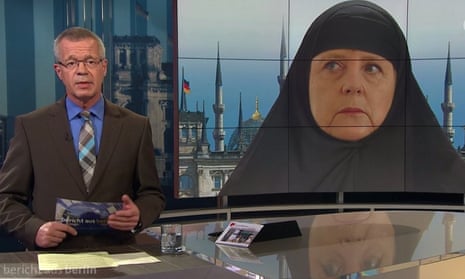German TV bosses have defended their decision to depict Angela Merkel wearing a black Islamic cloak against a backdrop of minarets on the Berlin skyline during a news item about refugees.
The ARD television programme Bericht aus Berlin was inundated with complaints on Tuesday after the photomontage of the German chancellor wearing the full-length cloak often worn by Iranian women was used as a backdrop.
Many accused the public broadcaster of anti-Islamic propaganda. The onscreen display accompanied an item by presenter Rainald Becker about the threat to German values.
Becker asked: “How is life changing? Indeed, how do we react when refugees have problems with equality, with women’s rights, with freedom of the press and free speech? These are questions for which we don’t have an answer, and questions that stoke fear.”
But ARD rejected the criticism, saying that the photomontage had been misunderstood “on many levels”.
A statement posted on its Facebook page, said: “The graphic had a direct connection to the presentation by Rainald Becker of a report about the values of our society. He was speaking about the achievements of our western society: freedom of speech, press freedom and equality. These freedoms were reflected in this graphic.”
It admitted its aim had been to polarise, but said it “decisively rejected any accusation that we are peddling anti-Islamic propaganda”.
The row comes in a week in which it has been estimated Germany may receive as many as 1.5 million refugees this year, and amid growing concerns as to how the country will cope in both the short and the long term with the challenge of integration.
